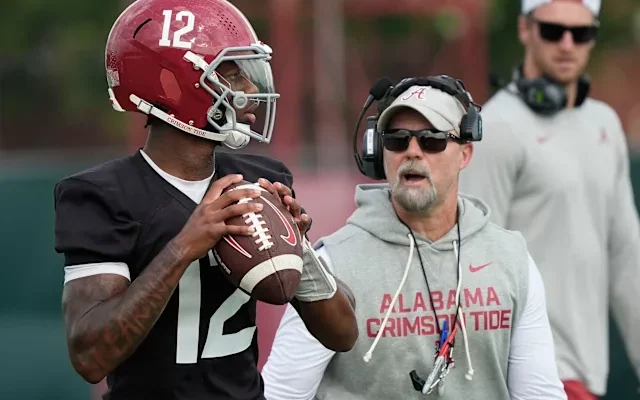In the storied history of Alabama Crimson Tide football under the leadership of head coach Nick Saban, defensive greatness has never been in short supply. From relentless pass-rushers to hard-hitting linebackers and lockdown corners, the Tide have produced a conveyor belt of NFL-ready talent that has dominated college football for nearly two decades. But when the conversation turns to naming the single greatest defensive player of the Saban era, a fierce debate ensues. For some, it’s a linebacker like C.J. Mosley or Rolando McClain. Others might champion the dominance of Quinnen Williams or the versatility of Minkah Fitzpatrick. But a growing number of Alabama fans and football historians are beginning to zero in on one name—a quiet assassin whose physicality, intelligence, and relentless work ethic defined a new standard for excellence in the Crimson Tide’s secondary. He wore No. 29. His name is Landon Collins.
Landon Collins may not have had the most media-fueled career of Saban’s defensive legends, but what he brought to Alabama was a sense of fearlessness, consistency, and sheer force that elevated every player around him. Recruited out of Geismar, Louisiana, Collins was a five-star safety prospect coming out of Dutchtown High School. His commitment to Alabama caused an uproar in his home state, especially since he chose the Tide over LSU, a program beloved by his family. That moment, televised nationally during the 2012 Under Armour All-America Game, would set the tone for the rest of his career—a fearless decision-maker who thrived under pressure and stood firm in the face of controversy.
Collins arrived in Tuscaloosa during an era when Alabama’s defense was transitioning to meet the demands of the modern spread offenses beginning to sweep through college football. Saban and defensive coordinator Kirby Smart were searching for hybrid defenders—safeties who could hit like linebackers but also cover like corners. Collins, with his 6-foot, 220-pound frame and lightning-quick instincts, fit the prototype perfectly. He didn’t need years of development. From the moment he stepped on the field, it was clear: Landon Collins was built for Alabama football.
As a freshman, he contributed primarily on special teams but made an immediate impression with his physicality and willingness to sacrifice his body for the team. He played behind All-American Ha Ha Clinton-Dix, learning the intricacies of Saban’s famously complex defense while sharpening his own elite tools. By his sophomore season in 2013, Collins was a full-time starter and cornerstone of the secondary. That season saw him rack up 70 tackles, 6 passes defended, and 2 interceptions, one of which came in a tight contest against Tennessee and shifted momentum permanently in Alabama’s favor.
But it was the 2014 season—his junior campaign—that cemented Collins as perhaps the most dominant defensive player of the Saban era. In that season, he tallied a team-high 103 total tackles, 7.5 tackles for loss, 3 interceptions, a forced fumble, and a fumble recovery. His presence in the defensive backfield was not just productive, it was imposing. Wide receivers entering his zone hesitated. Running backs couldn’t bounce outside without meeting a wall of muscle. And quarterbacks? They often chose to throw away from him altogether. He was a human eraser—nullifying whatever offensive scheme came his way with a combination of brute strength, elite IQ, and a sixth sense for anticipating the play before it unfolded.
Perhaps most impressive was the way Collins became the leader of Alabama’s defense, not with fiery speeches, but with action. While others celebrated with chest-beating antics, Collins quietly returned to the huddle, reset, and prepared to dominate the next play. That mindset—relentless, professional, and surgical—is what made him special. In a program full of stars, Collins was the engine. He wasn’t just a safety; he was the emotional and physical core of Alabama’s defense.
In the 2014 Iron Bowl against Auburn, a game that would define the Tide’s season, Collins was everywhere. He finished with a team-high 12 tackles and an interception. His fingerprints were on nearly every critical defensive stop. He was the reason Auburn struggled to convert in the red zone. He was the reason the Tigers couldn’t establish a consistent rhythm offensively. Alabama won 55-44 in one of the wildest Iron Bowls in history, and Collins was the anchor holding it all together amidst the chaos.
His accolades rolled in. He was named a unanimous All-American and a finalist for the Jim Thorpe Award, given to the nation’s best defensive back. NFL scouts drooled over his tape. He could play deep safety, he could come down into the box, he could cover tight ends and receivers alike. Most importantly, he had the rare ability to diagnose plays in real time and react instantly, often faster than the quarterback could deliver the ball. That kind of anticipation is what separates good defenders from generational ones. And Collins had it in spades.
He declared for the NFL Draft after his junior year, and while some Alabama fans wished for one more season, most understood that his draft stock could not be higher. The New York Giants selected him early in the second round of the 2015 NFL Draft. They were so eager to acquire him that they traded up to the top of the second round to ensure he didn’t slip away. In the NFL, Collins continued to build on the foundation he laid in Tuscaloosa. He became a three-time Pro Bowler and earned All-Pro honors in 2016 after a season that saw him record 125 tackles, 5 interceptions, and 4 sacks. But even as he carved out a strong professional career, his heart remained tied to Alabama.



